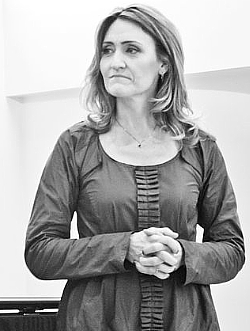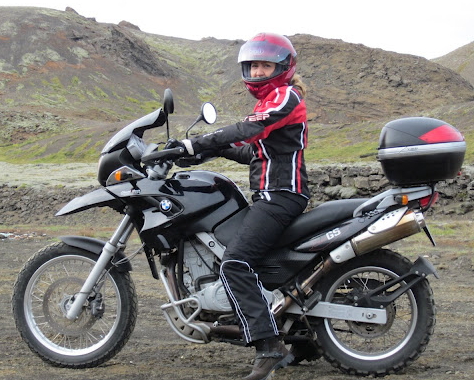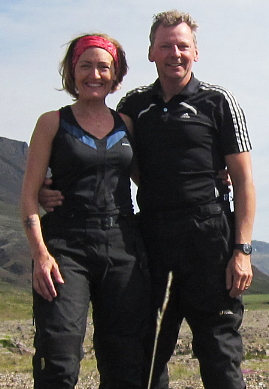Sigridur's Story

Sigridur was 46 when she was diagnosed with dermatofibrosarcoma protuberans at the thigh. She had wide excision surgery with a skin graft.
I am a biomedical scientist, am married and have three boys (15, 22 and 24). I have been very healthy and active all my life. Together with my family I have travelled a lot, and we often go swimming, skiing, diving, and hiking.
About two years before diagnosed, I noticed a very small lump on my inner right thigh, just above the knee. It was colorless and looked harmless; just like an ingrown hair maybe. It didn't vanish, so I decided to have it checked by a dermatologist. He took a small sample which showed an "unspecific inflammation." A year went by and it slowly grew bigger and started to get a pink/purple shade to it. At this time, I started to have very discomforting arrhythmias and had to go through two ablations. They were not a total success, so I had to go to regular check-up. Just before my last visit to the cardiologist I decided to do something further about that lump on my leg, as it was beginning to hurt. As I was working at a laboratory specializing in cancer diagnosis, I asked the two doctors, both cytologists, who owned the clinic to look at it. They both said it looked like lipoma or something harmless and saw no reason to do more. Still I felt something was not right, so I got an appointment with a new dermatologist. She opened the lump and tried to drain it, but only got "some old blood and fat," as she said, and threw it away! A few weeks later I went to see her again as the pain was growing and I could still feel the lump. Again she did the same thing as last time, but this time there was a lot of bleeding through the stitches after I got home.
The story repeated, so I went to a new doctor, this time a vascular surgeon. She took the rest of the lump and sent it to a histology lab. About a week later I called the lab myself to get the results (I was frequently calling them in my work, so this was no problem), and I got the answer: sarcoma. I went into "fight mode" and called the vascular surgeon and got things moving. Just five days later, I saw a chief surgeon who is specialized in treating sarcoma here in Iceland, and he planned the operation along with a plastic surgeon. Just three weeks after getting the diagnosis I was on the operating table. When thinking back about this time, I realize that I was driven by adrenalin; just like when you have a big project ahead and all the focus is on that project. I never cried or felt the need to talk to people about this. I just read as much as I could to get clear information on what to expect. The clearest moment, when looking back, is when I got the answer on the phone that this was Dermatofibrosarcoma Protuberans.
Treatment
The treatment chosen for me was wide excision and skin graft. It was done under total anesthesia and there were no severe complications. The doctors removed 9x13x4 cm piece from my inner thigh, down through the fascia, and had to remove the big vein in the leg along with some nerves, as the tumor was growing around them. A few hours after I woke up, heavy bleeding started, so I lost a lot of blood and my blood pressure dropped. The first days are not clear in my memory, as I was given morphine to cope with the pain. It made me rather sick, so these days were difficult. On the fourth day the pressure bandages were removed for the first time, and it revealed that the bleeding had damaged about 30% of the skin graft. The doctors decided to let time tell if this would heal by itself instead of doing an additional skin graft.
I stayed in the hospital for 2 weeks; first completely in bed, then using a wheelchair. Later I got a walker, and finally the day before I got home they gave me crutches. The weeks after coming home went by rather quickly, as I was so determined to recover. Nurses came every other day to attend to the wound and I practiced using crutches a lot. Because of the nerve damage I had to take Gapapentin and for the pain only Paracetamol, as I cannot tolerate strong pain killers. I dealt with a lot of pain during this time, but I have forgotten much about how bad it was.
I kept myself occupied during recovery by reading, working on my computer and writing. It was essential for me to keep from lying around and thinking too much. My husband was a strong "rock," and he helped me constantly. My three sons were kept well informed so they wouldn't worry and imagine the worst. I think it's crucial to keep children well-informed so they won't be anxious. As both my parents and my husbands' parents are dead, the family is scattered, so we went through this as just our small family. Our closest friend came to visit in the hospital, but afterwards we were not supported so much. This is understandable, as everyone has enough to do in their own lives. Therefore I sought professional help from a psychiatrist. I also contacted a support organisation for cancer patients. It is very helpful to share these experiences with people in similar circumstances.
Recovery
The weeks after the surgery were extremely painful. The donor site took about 3 weeks to close, and after that it took about a couple of weeks for new skin to start growing. Still it was sensitive for months, but I was able to go swimming about two months after the surgery. I was told to use vitamin-e oil and fragrance-free creams while healing and never to go into the sun without sun block.
The surgical site took a lot longer to heal. As mentioned before, 30% of the donor skin didn't grow because of hemorrhage, and it took the wound about two months to close, so I wasn't allowed to take a bath or go swimming. As the tumor was so close to the knee and the doctors had to remove the fascia of two muscles and then sew them together, this affected my ability to use the leg. It hurt to take a step for more than a year, but things gradually improved. I had to take Gabapentin during this time and Paracetamol.
Two months after surgery I went regularly to see a physical therapist to help me regain muscle strength and to learn exercises to do at home. Now, well over two years later, I still have bad days where I have constant discomfort and cannot bend my knee.
 My mental state has been as unstable as the weather in Iceland (which is NEVER the same). For the first 4-5 months I was a fighter, showing just how strong I was and not allowing myself to give up or cry. This was, after all, "just" DFSP. I even started to learn to ride a motorcycle in driving school just two months after surgery, just because I realized that in the upcoming summer I would not be able to hike and would need other things to enjoy. I got my license after three weeks in school and travelled all over the country (over 4000 kilometers that summer).
My mental state has been as unstable as the weather in Iceland (which is NEVER the same). For the first 4-5 months I was a fighter, showing just how strong I was and not allowing myself to give up or cry. This was, after all, "just" DFSP. I even started to learn to ride a motorcycle in driving school just two months after surgery, just because I realized that in the upcoming summer I would not be able to hike and would need other things to enjoy. I got my license after three weeks in school and travelled all over the country (over 4000 kilometers that summer).
In the fall, I was feeling more and more anxious and a little depressed at times without doing anything about it; I just said to myself that this was normal. I was planning to finish my education as a classical singer, so you could say that I drowned myself in work, school, training and just about everything except listening to my feelings. In April 2011, just a year after the surgery, I collapsed. I got an appointment with a doctor who is both an oncologist and a psychiatrist and he put me on sick leave for at least six weeks (he said afterwards that he knew it would be longer, but he just said six weeks to me so I would not disagree). In his opinion I suffered from posttraumatic stress disorder and burn-out. By that time, I was sleepless, very depressed, anxious and hopeless. I even thought often about taking my life, as I saw myself as a useless burden on my husband and three sons.
Just four weeks into this leave, I got a letter of termination. As it is not legal to do that to people when sick, my employers said that the reason was reorganization of the company. So this did not help my situation. By seeking professional help and following professional advice, I managed to gradually get stronger and happier. It has now been over a year and I am still on sick leave, but I'm feeling ready to move on. It is not a straight path to recovery; I have stumbled a lot, but keeping the goal to get better clear in my head has kept me moving onward all the time.
Life Now
 Today I am a very different person than before the sarcoma. Of course life changes us all, but this kind of experience pushes you very quickly and roughly through those changes. At times I have experienced a kind of grief over the loss of "old me." It has been so difficult to make a new life with new routines. Not only are my physical capabilities not the same, but my values and longings have also changed so much. Now I live in the moment, enjoying the smallest things I used to take for granted. I follow my instinct more when making decisions and work all the time on making my life simpler. This has made me calmer and happier, and I have a clear image of myself and what I stand for. There really is nothing I cannot do; I just have to be clear about what I want to do.
Today I am a very different person than before the sarcoma. Of course life changes us all, but this kind of experience pushes you very quickly and roughly through those changes. At times I have experienced a kind of grief over the loss of "old me." It has been so difficult to make a new life with new routines. Not only are my physical capabilities not the same, but my values and longings have also changed so much. Now I live in the moment, enjoying the smallest things I used to take for granted. I follow my instinct more when making decisions and work all the time on making my life simpler. This has made me calmer and happier, and I have a clear image of myself and what I stand for. There really is nothing I cannot do; I just have to be clear about what I want to do.
As I said earlier, I got my motorcycle license and today one of my greatest passions is travelling with my husband, each of us on a motorcycle, with just a small tent and essentials in our luggage. I have also done things I never thought I would be able to after the sarcoma. I have been skiing both cross country and on slopes, and this summer I did my first climb to a mountain top. It was no Mount Everest, but it was still a victory for me. After all I have been through these last years, I have an urge to use this experience to help others through their problems, but was not sure how to do so. Almost out of nowhere I found the path: This spring I got my diploma as a clinical hypnotherapist. Hypnotherapy did a lot for me when I was in a dark place and having a lot of physical and mental pain, so therefore I find it to be a good way for me to help others through hypnotherapy. I am working on building up a practice and look forward to the future. My husband and three sons have been there with me through it all, and we stand stronger together than ever.
Thoughts and Hints for New Patients
As I live in a country of only 320,000 people, there are not many people in my situation. I would recommend that patients get in contact with people who have been through the same thing so they can get real answers that are not theoretical. The first days after diagnosis are filled with questions, anxiety, and all kinds of emotions, and family members are not always the right people to consult, as they are confused too. The nature of the mind is to find answers, and we "fill in" with our imaginations by guessing, and often those guesses are not realistic. Therefore everyone should have a contact person to talk to.
I think it is important not to let your home become a kind of hospital. It can destroy a family if everyone is constantly absorbed with cancer all the time; try to keep things normal and seek help from professionals who have the education and experience to deal with this difficult situation. Family members are not doctors or nurses.
I believe that it is crucial to have something to do every day to keep your mind from being stuck in illness, pain and suffering, as that only leads to depression. Instead try to have a routine, and do what you enjoy. If it seems hard to begin, then go to a cancer support clinic and be a part of their work. Just don't give up. This journey should not be a fight to go through with bloody knuckles, but rather like a walk from the valley bottom to the top, up a grassy slope with flowers, rocks and brooks, where you occasionally have to rest but see that you are slowly moving away from the bottom towards the top.
Leave a Facebook Comment
Copyright © October 2012 Liddy Shriver Sarcoma Initiative.
